The Lilith Blog
September 1, 2017 by Amelia Dornbush
Head of Workmen’s Circle on Strike Solidarity, Yiddish, and Fighting Fascism this Labor Day
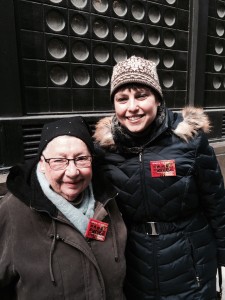
Ann Toback, executive director of the Workmen’s Circle, with Rita Margulies, Clara Lemlich’s daughter.
While marked by many as the unofficial end of summer, Labor Day also has a radical history that began 135 years ago. On September 5, 1882, thousands took to the streets to demand better working conditions, an eight-hour workday and a Labor Day. Twelve years later, in an attempt to defuse tensions following the Pullman strike, the first Monday in September would become officially recognized by the federal government as a holiday for workers.
In honor of this history, Lilith’s Amelia Dornbush interviewed via email the executive director of the Workmen’s Circle, Ann Toback. The conversation ranged from the future of the labor movement to the continued influence of radical Jewish women and what lessons from 5777 to carry into the New Year.
- No Comments
August 30, 2017 by Sandra Korn
What’s a Jewish Ritual Doing at a Confederate Monument?
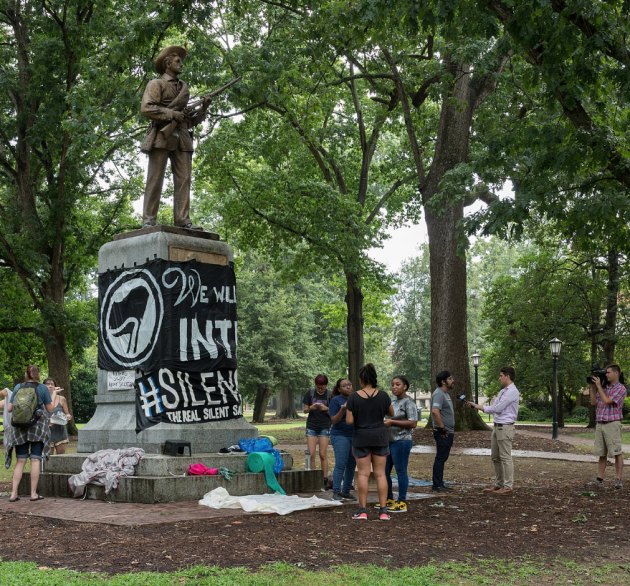
Photo credit: Martin Kraft
Where might it be appropriate, in this day and age, to say a prayer for the destruction of idols? For Abby Weaver, a student at Smith College who grew up in Chapel Hill, North Carolina, the best site for this prayer is the student sit-in in front of UNC Chapel Hill’s “Silent Sam”—a confederate monument.
Undergraduates at UNC are holding vigil at Sam’s feet—sleeping out on air mattresses, talking to passersby during the day and drunk students at night, and occasionally confronting white nationalist counter-protestors. Weaver, along with a group of others from the local Jewish community, led Shabbat services at the site of this protest.
Silent Sam was erected in 1913 by the United Daughters of the Confederacy as a monument to UNC students who served as confederate soldiers in the Civil War—and as a warning to Black North Carolinians, in the Jim Crow South, that UNC was still an institution of white supremacy. At the monument’s dedication, Julian Carr proudly told a story of anti-Black violence: “100 yards from where we stand, less than 90 days perhaps after my return from Appomattox, I horse-whipped a Negro wench, until her skirts hung in shreds, because upon the streets of this quiet village she had publicly insulted and maligned a Southern lady.” For decades, Silent Sam has stood at the heart of UNC’s campus as a monument to racial oppression: in fact, Alice Sparberg Alexiou, writing in Lilith last year, remembers how Silent Sam inflected her mother’s experience of anti-Semitism at UNC in the 1940s. For decades, Black students have organized to demand the statue’s removal.
- No Comments
August 29, 2017 by Yona Zeldis McDonough
The Unsung Jewish Woman Who Helped Found Planned Parenthood
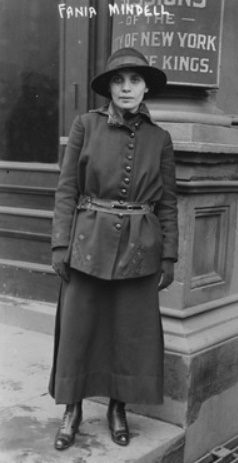 The name Margaret Sanger will forever be linked to Planned Parenthood; she was the engine and the driving force behind the organization that was once seen as radical and transgressive—and may in fact seem so again in the very near future since many Republicans are rabid to defund Planned Parenthood using any justification possible. But when I began researching the history of Planned Parenthood for a project of my own, I learned that there are two other lesser known names associated with the founding of this irreplaceable organization: Sanger’s sister, Ethel Higgins Byrne, and an unsung Jewish woman named Fania Mindell.
The name Margaret Sanger will forever be linked to Planned Parenthood; she was the engine and the driving force behind the organization that was once seen as radical and transgressive—and may in fact seem so again in the very near future since many Republicans are rabid to defund Planned Parenthood using any justification possible. But when I began researching the history of Planned Parenthood for a project of my own, I learned that there are two other lesser known names associated with the founding of this irreplaceable organization: Sanger’s sister, Ethel Higgins Byrne, and an unsung Jewish woman named Fania Mindell.
Mindell was born in Minsk, Russia on December 15, 1894. She emigrated to Brooklyn, New York in 1906 with her family. She was an accomplished artist, and became a set and costume designer for Broadway theaters in New York, and her theatrical interests extended to translations of dramatic materials from Russian to English. Her version of Maxim Gorky’s play, “Night Lodging,” was performed at the Plymouth Theater in 1920; Edward G. Robinson was among the performers. A woman of many interests and talents, Mindell was also the proprietor of Little Russia, a small boutique in Greenwich Village, just off Washington Square, which featured curios from Russia, but her true passion was for feminist and progressive causes.
- No Comments
August 28, 2017 by Eden Gordon
A Jewish New Yorker Becomes a Tibetan Pop Star. Plus… She Sings in Yiddish on Mongolian TV.
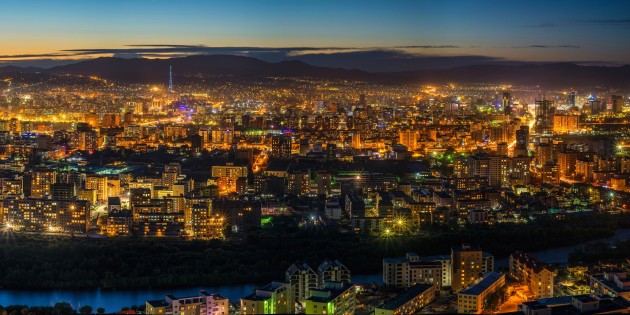
Ulaanbaatar, Mongolia at night.
Amalia Rubin has covered a lot of ground. I spoke to her recently via Skype, from my house in New York to her apartment in Ulaanbaatar, Mongolia’s capital city, where she has been living for two years. We bonded over our cats, who both wouldn’t stop climbing across our respective computer keyboards. In person (or in a pixelated reproduction of a person) Amalia Rubin is funny, charismatic, and full of incredible stories ranging from hysterical to heart-wrenching.
And she certainly has ample experience to draw from: she’s been a Tibetan pop star, sang in Yiddish with a Mongolian band on a Mongolian singing competition, speaks and writes in fluent Tibetan, and is now working on a book about Mongolian shamanism, all while teaching and promoting culturally sustainable development and maintaining her Jewish culture.
Her dedication to both her own culture and others’ is remarkable. She has pulled disparate threads of her life and worldview into a strikingly harmonious composition.
- 1 Comment
August 25, 2017 by Katie Goldstein
Why Should NYC Have More Condos? How Congregations Can Work Against Gentrification
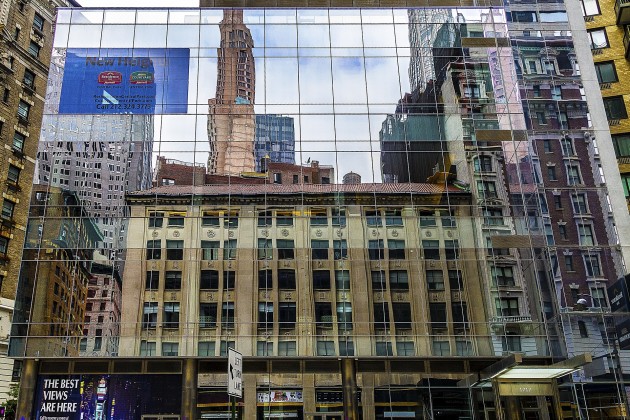 In July, Shaare Zedek, a 179-year-old synagogue on Manhattan’s Upper West Side, a congregation founded by Polish immigrants, announced that they will be selling their land to a developer. The Real Deal reported that the first three floors would be used as a community facility for the synagogue, while the rest will be used for luxury housing—including 20 condominiums. In a city that is being destroyed by unfettered condo construction for the 1%, this has been a troubling trend for struggling faith institutions in the neighborhoods targeted by real estate developers.
In July, Shaare Zedek, a 179-year-old synagogue on Manhattan’s Upper West Side, a congregation founded by Polish immigrants, announced that they will be selling their land to a developer. The Real Deal reported that the first three floors would be used as a community facility for the synagogue, while the rest will be used for luxury housing—including 20 condominiums. In a city that is being destroyed by unfettered condo construction for the 1%, this has been a troubling trend for struggling faith institutions in the neighborhoods targeted by real estate developers.
I have been a housing justice organizer for 10 years in New York City, and in that time the city landscape has been transformed by luxury housing. I saw this when I was working at Jews for Racial and Economic Justice organizing synagogues to ensure real and deep affordable housing in the new real-estate development in the Lower East Side, a famous Jewish immigrant haven. And I’ve seen it as the interfaith child of a pastor of Judson Memorial Church.
Judson has the same resources as Shaare Zedek: land and air. The church’s Greenwich Village neighborhood has become a real estate playground that has seen massive rent increases and gentrification. Judson’s congregants are struggling with issues of affordable housing and the core moral question of New York: who can afford to live, survive, and thrive here?
- No Comments
August 24, 2017 by Yona Zeldis McDonough
The Communist and the Communist’s Daughter: An Interview with Jane Lazarre
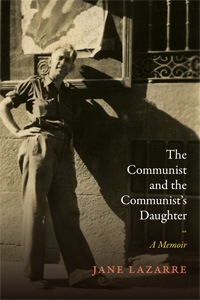 In a letter to his baby grandson, Bill Lazarre wrote that “unfortunately, despite the attempts by your grandpa and many others to present you with a better world, we were not very successful.” Born in 1902 amid the pogroms in Eastern Europe, Lazarre dedicated his life to working for economic equality, racial justice, workers’ rights to name just a few of his goals. He was also dedicated to his family, especially his daughters, whom he raised as a single father following his wife’s death. In this highly nuanced and sensitively written book, Jane Lazarre weaves personal memories with documentary materials—such as her father’s massive FBI file—to tell his fascinating history as a communist, a Jew, and a husband, father, and grandfather.
In a letter to his baby grandson, Bill Lazarre wrote that “unfortunately, despite the attempts by your grandpa and many others to present you with a better world, we were not very successful.” Born in 1902 amid the pogroms in Eastern Europe, Lazarre dedicated his life to working for economic equality, racial justice, workers’ rights to name just a few of his goals. He was also dedicated to his family, especially his daughters, whom he raised as a single father following his wife’s death. In this highly nuanced and sensitively written book, Jane Lazarre weaves personal memories with documentary materials—such as her father’s massive FBI file—to tell his fascinating history as a communist, a Jew, and a husband, father, and grandfather.
Soon after immigrating to the United States as a young man, Lazarre began a long career as a radical activist. He held leadership positions in the American Communist Party, fought in the Spanish Civil War, organized labor unions, and testified in front of the House Un-American Activities Committee where he refused to name names. He was convicted of sedition, and resisted the FBI’s efforts to recruit him as an informant. Through periods of heroism and deep despair, Bill Lazarre never abandoned his ideals or his sustained faith in the fundamental goodness of people.
His daughter Jane—a novelist (an excerpt from her novel, Inheritance, appeared in Lilith), essay writer, teacher—weaves her own story into the one she writes about him. She examines the nature of memory, grief, love, and conscience while detailing the sacrifices, humanity, and unwavering convictions of the exceptional man who shaped her.
Fiction Editor Yona Zeldis McDonough posed some questions to Lazarre about the impact she hopes her book will have and its relevance in our own politically turbulent time.
- No Comments
August 23, 2017 by Rebecca Mordechai
Subversion, Sex, and Savoy Cabbage: Reclaiming Azerbaijan’s Jewish Cooking
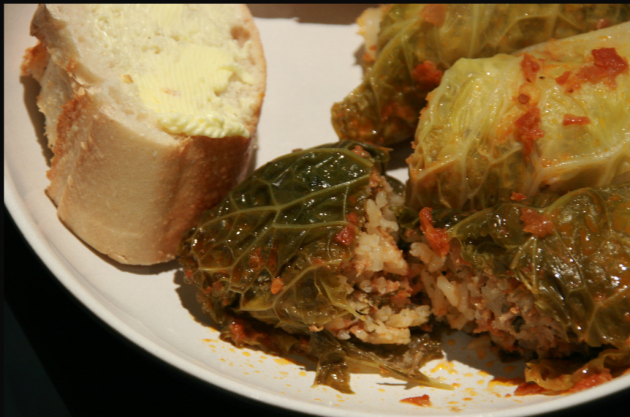
Photo credit: Lou Robinson
“Can I cook with you?”
“Repeat what you said.” Blatant surprise lingered in my mother’s voice.
That was to be expected. I can master only the contents of a kid’s menu: mac and cheese, home fries, perhaps, if I’m feeling fancy, breaded chicken cutlets. What my mother makes, however, is the Russian novel of cuisine—layered, complicated, and undeniably time-consuming.
But I was having guests over for Shabbat dinner and I wanted to be as Martha Stewart as possible. My guests were Ashkenazic millennials who, after decades of munching on potato kugel, craved to challenge their palates with Eastern saffron and sumac.
“Can you cook a dish with your mom?” Erica asked, as she was lounging on my couch one day.
“Yes. You’re from Azerbaijan. Cook lamb!” Josh piped in from the kitchen.
But my friends didn’t quite comprehend how Azeri Jewish cuisine signifies a weighty inner conflict, and why I often resist cooking it.
***
- No Comments
August 17, 2017 by Eden Gordon
Emotions & Math: Rebecca Newberger Goldstein on Orthodoxy, Reason, and Love
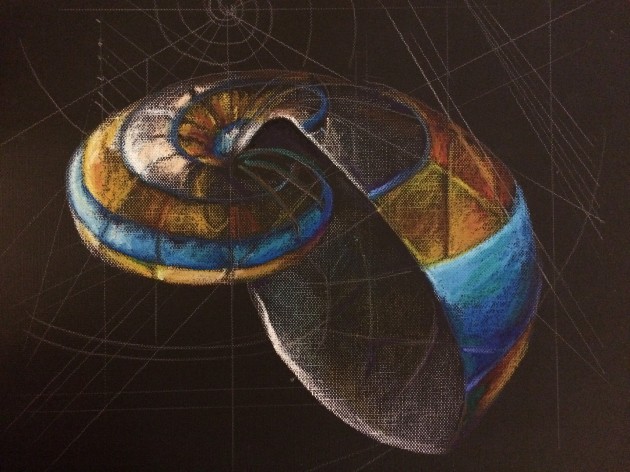 When Rebecca Newberger Goldstein speaks and writes, her words are often undercut by a slight but unmistakable sense of humor. It’s as if she is perpetually half-smiling at the impossibly contradictory paths that her life has taken.
When Rebecca Newberger Goldstein speaks and writes, her words are often undercut by a slight but unmistakable sense of humor. It’s as if she is perpetually half-smiling at the impossibly contradictory paths that her life has taken.
It’s a humor that belies a deep, malleable understanding. I was able to experience this firsthand when I heard her speak at a reunion for Barnard College alumnae this June. I am just about to enter my junior year at Barnard, but I was at the reunion with my grandmother, who graduated in 1962. We had just emerged from a long and lively discussion with some members of her graduating class, and we made our way to a familiar lecture hall to hear this self-professed “wayward philosopher” discuss her career.
Before I heard her speak that day, I actually hadn’t heard of her at all, something that seems incomprehensible to me now; since that day, it seems I see her books displayed front and center in every bookstore I enter.
- 2 Comments
August 16, 2017 by Rabbi Annie Lewis
We Will Not Be Comforted
The following is a transcript of a speech delivered by Rabbi Annie Lewis at vigil for Charlottesville in Philadelphia this past Sunday.
Good evening. Thank you to all of the organizers and speakers at tonight’s vigil.
We stand here tonight with broken hearts.
As our hearts break again and again and again, we are filled with sadness and indignation and a love that will not give up.
We begin with a moment of silence in memory of those who were killed in Charlottesville – Hether Heyer, Lt. H. Jay Cullin and Trooper-Pilot Berke MM Bates.
We hold in our hearts all those who are injured, all those who are shaken and in need of healing, in Charlottesville and all around our country.
In the words of the prophet Jeremiah, “Thus said the Lord: A voice is heard in Ramah, lamentation, and bitter weeping, Rachel weeping for her children; she refuses to be comforted for her children, because they are no more.” (Jeremiah 31:15)
In the Jewish calendar, we recently marked the saddest day of the year, the 9th day of the Hebrew month of Av. It’s a day when we mourn the destruction of our ancient temple. It’s a day when we lament all traumas across time and space triggered by the fires of causeless hatred. On that day we cry, we lament, and we weep.
Then, the cycle of our year carries us into a period of consolation.
We are now in a period known as the seven weeks of consolation.
But this year, we do not find comfort.
Like our mother Rachel, we refuse to be comforted.
- No Comments
August 15, 2017 by Julia Revzin
I’ve Never Felt More Jewish Than I Did at Charlottesville
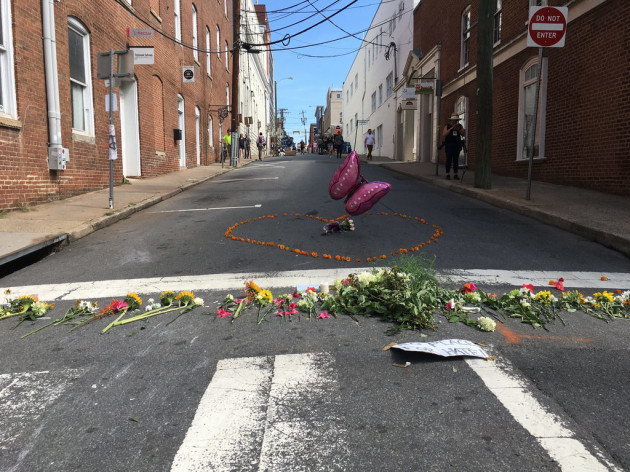
Photo credit: Evan Nesterak
Three weeks ago, I was in Israel on my Birthright trip. The program did what it was supposed do, I suppose. I felt very connected to my Judaism, to my Jewish identity, especially as a secular Jew from a mostly non-religious, non-practicing family. I thought about maybe attending synagogue when I got home.
Two weeks ago I bought Shabbat candles, which they actually do have in grocery stores in Virginia, go figure, and promptly stuck them into a drawer, with a vague notion of maybe lighting them the following week and staying off Netflix for a day.
And then this Saturday, the Nazis came.
- 1 Comment
 Please wait...
Please wait...